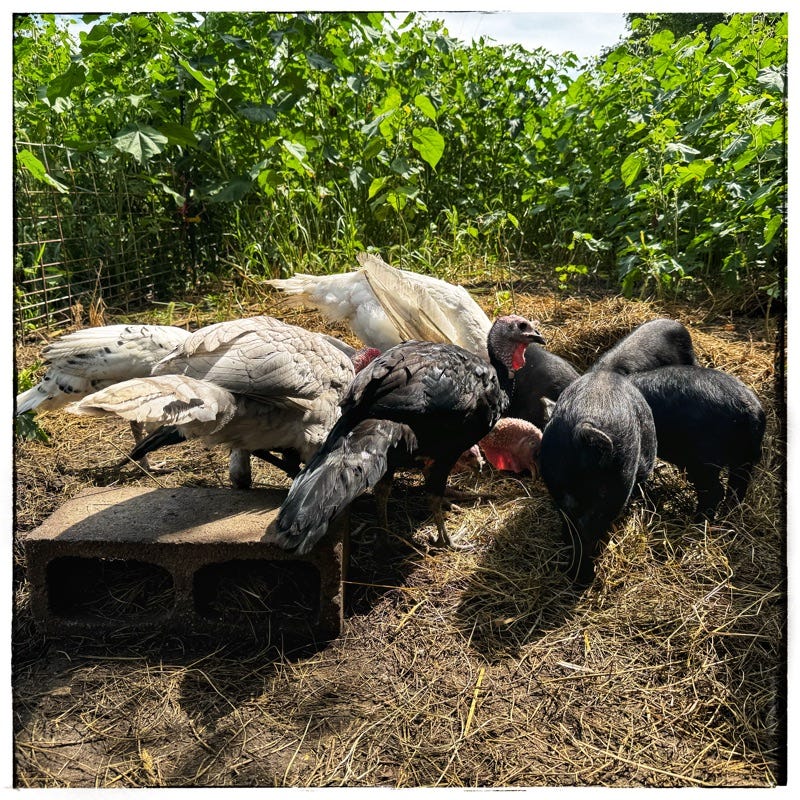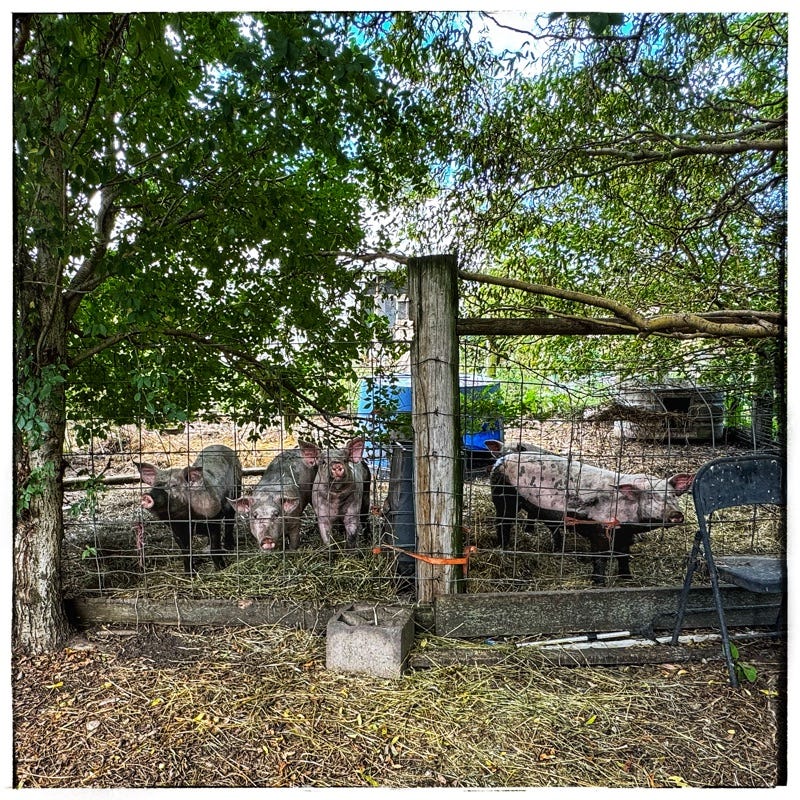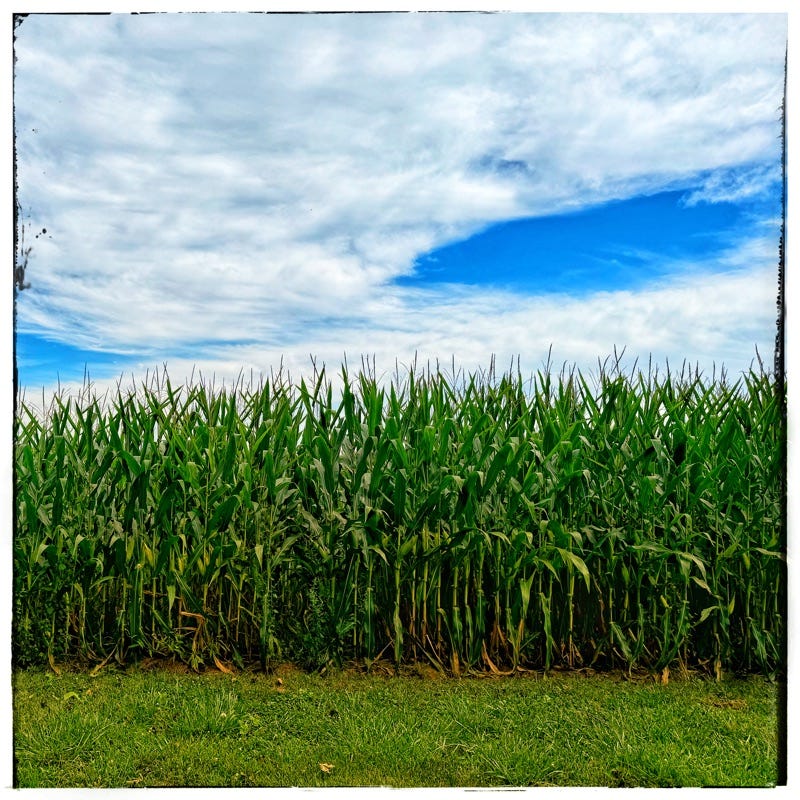TKG Sunday: Sweat: Why the Bad Rap?
Sweating is a natural and healthy response to an active, hot mama lifestyle. So why do we try to hide it?
People sweat. And humans have the best personal cooling system out of all the other animals on my farm. We sweat. Deal with it.
Turkeys and chickens don’t sweat, they will pant, spread their wings and seek shade.
Cows have sweat glands in their skin, with each hair follicle having its own gland. But cows sweat only 10% of what a human can sweat, pound for pound, so they will seek shade, eat less when hot and remain still for the hottest parts of the day. (Cows are ruminants so they are carrying around a number of bellies full of hot compost which is great in winter - not so great in the summer. Cows do not do well in the heat).
Pigs do not sweat. Whoever says '“I am sweating like a pig.” Is not sweating at all. Pigs will wallow and cover themselves in mud to cool off. Tima just lies in her water bowl. Sigh.
Dogs sweat through their feet and their noses. Which honestly does not sound convenient.
Humans sweat, really efficiently if our cultures allow us to. We bleed. We sweat. We cry. We do all of those visceral things.
Embrace the benefits of your working sweat glands - sweating is a natural and essential process, especially as summers become more intense. When our sweat glands function at their best, we humans will be better equipped to stay cool and perform well in a warming climate than many of our pets.
I was researching about sweat in relation to climate change and found this interesting article for you. Kate Yoder, writing for Wired, points out that the ability to sweat can be instrumental in our ability to adjust to rising temperatures due to our changing climate.
And this is why we need to keep our sweat glands healthy and flowing.
After a brief bout with heat stress this last week I opened a discussion on the Farm Blog about humidity and corn sweat and as you know our little farm this year is SURROUNDED in corn. And corn sweats. Who knew.
Human bodies are meticulously regulated to maintain an internal temperature of around 37 °C, vital not just for physical well-being but also for cognitive processes. So writes Avery Schuyler Nunn for the National Geographic. She goes on to write how our ‘evolutionary path has finely attuned us to temperature fluctuations for our survival. Detecting even minor shifts likely served as an early warning system, prompting actions like seeking shelter, adjusting clothing, and adapting behaviours to stay comfortable’. All of which we do. And when it is hot we sweat to further regulate our temperatures.
Sweat is good. Sweat relieves our bodies of toxins. Sweat cools our bodies down. Sweat keeps our pores clear and healthy. Sweat even releases endorphins. Sweat is used to send scent signals. Signals that indicate health.
Why then does sweat have such a bad rap? Why do we feel we need to smother our armpits with deodorants. Is it because our sweat gives the people around us a little too much information? An omnivore will smell different from a vegetarian for instance. An older person with a high chemical intake due to medications will have a different smell to a young person who eats nothing but Cheetos and peanut butter sandwiches.
When I was a teacher, in New Zealand, I was standing with my home room class at an assembly. As you know I was a drama teacher so all my students could communicate with me using Back-Stage sign (our very own silent language). You will remember it from this story. It was not sign language per-se just silent communication. It was morning. A summer day. I was standing with my students, we were all a little bored as the assembly droned on, it was already hot. I stood facing the stage with the kids to my left in racked bleachers of old shiny pine. As the summer breeze blew through from the open doors of the hall I was overwhelmed by the scent of fermented - bar room the next morning - alcohol. I put my knuckle lightly to my nose, turning my head and widened my eyes at my senior students. “Who was drinking last night?’ I asked them without words and very subtle signs. My small group of senior students widened their nostrils at me, shook their heads and pointed with their eyes to the science teacher who was arriving, late to assembly, to stand right next to me. I leaned ever so slightly towards him, sipped at the air and sure enough the young man was sweating straight gin. I looked back at my seniors and tipped my head slightly sideways. “Yes, miss”, they said with their eyes and faces. “Sad, aye”. They loved this teacher.
The scent of this man was like a story book. I could smell the drink, the pizza from his dinner, his anxiety, his clogged system, a wash of olfactory sign posts. His deodorant was struggling to cloud those clues from the people around him. I was his senior teacher so I was able to take him aside in his spare period later that day and bring him into my office for a gentle chat. He did have a drinking problem and he was struggling. His recovery is another story. A good one. And his to tell. But I tell you this little story to show how sweat is used to eliminate toxins from the body as well and sometimes to send out distress signals (not to mention come-hither signals). So to block the movement of sweat through the pores interferes with the natural order of these things.
I will admit here that I personally seldom wear deodorant. I am on a farm - if the pigs tell me I stink then - Hello! Straight back at ya buddy. But when I travel or go out with friends, I certainly apply deodorant. As a social nicety.
A few interesting facts about sweat:
Sweat rate is proportional to metabolic rate and while exercising or farming for hours in the hot sun a person can sweat up to 3–4 litres per hour, or as much as 10 litres per day. (This number makes no sense to me as I only drink maybe 2 litres of water a day. Maybe I should increase that.)
Muscle produces more heat than fat, so people with more muscle mass sweat more and fit people sweat more too.
Sweat is a liquid made up of 99% water and 1% salt and a little fat.
The average person has between 2 and 4 million sweat glands in their skin, (not all of which are active in everyone) but we are going to need every single one of those sweaty pores to help cool our bodies as the temperatures rise.
How? Keep your skin and pores healthy. HYDRATE. Exfoliate. Wear natural fabrics (ladies; gradually replace synthetic leggings for cotton or wool leggings - for more than one reason). Wear layers so as you heat up you can reduce the clothing. Be a little less rigorous with the deodorant. What else?
Last year, in the US, we spent $6.6 billion on deodorants. Smelling artificially sweet is big business. We could talk about the aluminium in deodorant possibly contributing to some health issues like cancer and Alzheimers, but today I would like us to think about using deodorants just a little less, for the health of our pores and to keep our sweat glands open and vigorous.
What is the difference between pores and sweat glands? Well, I am glad you asked: “Pores are tiny openings in the skin that release sweat from sweat glands, while sweat glands are tubular structures that produce sweat. Sweat glands are located throughout the body, but are more concentrated in areas like the palms, armpits, and groin. Sweat glands are under the skin in the dermis, and they open onto the skin's surface through pores. The coiled tube-shaped glands are located in the deeper dermal tissue, and a duct connects the tubule to a pore in the epidermis”. Encyclopedia Britannica.
You are going to be needing healthy skin and pores to help your mercurial brain and your finely tuned body adjust to the extremes in temperature as they arrive. It is getting hot out there, and your body is sensitive to temperature changes, it is all set up for this stuff, let your body help.
Sweat.
Now over to you. How do you care for your sweat glands and keep your skin healthy.
Farmy Round Up
The Cows
R (my 2IC) has been feeding the cows treats on her farm days.
Now the cows gallop over when they see her they literally line up for her to hand feed them! Here she is giving them slices of whole grain bread we get from a local supermarket - they give us out of date bread instead of throwing it in the dumpster.
The PopPops
No matter how far they roam in their field, the moment I call they come thundering home.
And now so do the turkeys! I make sure to call the PopPops often and reward them with vege or fruit treats. So far they have only escaped once which I know is just luck!
The Turkeys
I no longer lock the turkeys in at night. So they have taken to roosting along the top of their gate.
Except this one. He is much bigger than the others with two misshapen wings. He arrived with odd shaped precarious looking wings that do not fold in properly. He cannot fly. So while all the others roost he lays down on ground level.
This is why the turkeys never stray far from the PopPop field. He cannot fly over the gate and the flock will not leave him behind. So - so far - as long as the gate remains shut, the turkeys remain off the porch. Win. Win.
The Ducks
The ducks have settled into being the most beautiful on the farm.
They only receive a handful of grain at the barn to keep them close. Otherwise they graze and eat pond weed. Ducks do not sweat. They need their water!
The Chickens
After some low egg counts during those hot days we are seeing more eggs and more activity.
Interestingly I gave these layers a huge bucket of left over bread one day (we get unsold bread from a local supermarket) and their egg laying dropped off almost completely for three days after. I did this twice more to check my theory (I let them recover their laying numbers between each trial) and was shocked at how fast supermarket white bread (which I would not eat in a million years) affected their fertility.
So - even though they love it they cannot have bread again. Same for me for other reasons!
The Charlottes
These pink and white pigs spend all day in the mud.
All the farm hands are instructed not to go in with them. They bite. Not in an aggressive way just in a “just a wee taste” kind of way.
The Chicks
This flock is R’s flock. They will grow here for another 8 weeks. They go nuts over grated zuchinni. They don’t sweat either so they have no heating lamp and we have released them into the big brooder for better air flow. Those hot days were dangerous for our wee chicks. A tip: if your chickens overheat place their feet in cold water - it revives them quite quickly.
The Fields
Still growing upwards but you can see that the lower leaves have begun to dry up.
This will continue until the whole field is dry. The corn dries in the field. Soon it will rustle as the breeze brushes through - I will make sure you hear that, when we do a walkabout before harvest. It is the sweetest most evocative sound. You can hear the wind approaching. So cool.
Have a lovely day!
Don’t forget to leave me a comment.
Go forth and SWEAT freely!
Celi












Fascinating facts thank you. I gave up using deodorant some years ago, the contents looked so scary. I confess l do get damp in hot weather but never smell simply by washing under my arms every morning. I hate synthetic materials on my body. What loyal turkeys, not so bad after all. Pop pops are the Top pops 👌💖
What a fascinating deep dive into the world of sweat! I never thought I'd be so intrigued by something we often try to hide or minimize lol!
I love how you've tied this all back to climate change and our need to work with our bodies, not against them. Aluminum-free deodorant for the win.
I hope you are having a good week Cecilia.
Thank you for sharing.